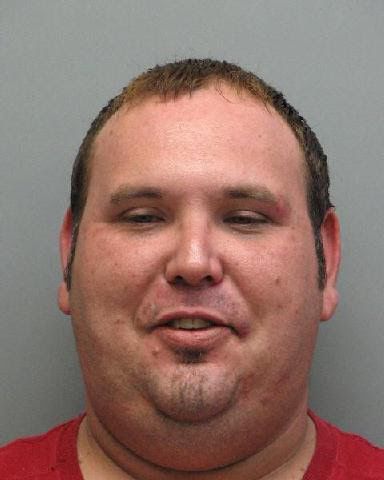
Arrest made in cerebral palsy can thefts
August 3, 2016
Judge upholds search of Exposedat computers
August 6, 2016A Terrebonne Parish judge will hear arguments Friday afternoon as to whether authorities can move ahead with a search of computers seized from a Houma police officer’s home in connection with their investigation of a criminal defamation complaint. The complaint was lodged by a local insurance broker, arising from statements made on a website that alleges corruption by public officials.
State District Court Judge Randall Bethancourt signed the warrant used Tuesday to seize laptop computers and cell phones from the residence of the officer, Wayne Anderson. Houma Police Chief Dana Coleman said Anderson is on paid administrative leave, pending resolution of a case that has generated extensive local turmoil. Anderson has not been charged with a crime.
Word of the warrants sparked accusations that authorities are using the weight of criminal law to attack the free speech rights of their critics, a contention that Terrebonne Parish Sheriff Jerry Larpenter vehemently denies.
Interviews indicate that the planned examination of the computers is one step in the process of determining the identity of “John Turner,” the pseudonym of the person who actually maintains the blog, “Exposedat,” billed on its Facebook page as a “Terrebonne Parish, Louisiana Underground Watchdog Group.”
The devices are currently in the custody of Terrebonne Parish Clerk of Court Theresa Robichaux, pending Bethancourt’s decision.
MALICIOUS PUBLICATION?
Sheriff Jerry Larpenter acknowledges that his detectives are “conducting a criminal investigation pursuant to a complaint filed by Mr. Tony Alford on behalf of himself and his business.”
“The complaint is based on Louisiana Revised Statutes 14:47, defamation. The complaint conforms to the statute in question and is a criminal issue, not a freedom of speech. The investigation is ongoing and no further information will be released until the investigation is completed and possible criminal charges are filed.”
The website’s address is http://exposedat.in/wp/.
Part of the statute referred to was declared unconstitutional by the U.S. Supreme Court in 1964, but portions are considered valid.
The statute defines criminal defamation as “the malicious publication or expression in any manner, to anyone other than the party defamed, of anything which tends: (1) To expose any person to hatred, contempt, or ridicule, or to deprive him of the benefit of public confidence or social intercourse; or (2) To expose the memory of one deceased to hatred, contempt, or ridicule; or (3) To injure any person, corporation, or association of persons in his or their business or occupation.”
The law provides for a $500 fine upon conviction, imprisonment of not more than six months or both imprisonment and a fine, making it a misdemeanor.
The “Exposedat” Facebook page has generated 561 “likes.”
Accusatory in tone, the site features copies of documents that purport to link Terrebonne Parish President Gordon Dove, District Attorney Joe Waitz Jr. and Larpenter in a variety of alleged unholy alliances. The accusations do not pretend to be objective in nature. Some are dated, based on incomplete information, and in general have not been reported on by traditional media.
CONTRACT NOT PROHIBITED
One focus has been on the business dealings of Alford, whose insurance firm has a contract with the Terrebonne Parish Sheriff’s Office, and which was awarded a contract last week by the Terrebonne Parish Council. Alford and Dove are long-time friends and partners in a number of business ventures. Citing a debt Alford was saddled with after one of their joint ventures failed, the text on the site suggests that the contract is how Alford was paid for a $292,864 loss.
Alford’s dealings with Larpenter and the Sheriff’s Office were described as “suspect” because, according to the site’s allegation, Larpenter’s wife is employed by the insurance firm. The position is one she held prior to her marriage to Larpenter.
“We wonder if Sheriff Larpenter insists that Tony pay his wife Priscilla such a large amount in exchange for continuing the broker agreement? You scratch mine and I’ll scratch yours?,” states Exposedat.
The bonuses Priscilla Larpenter earns, Alford avers, are in no way connected to his dealings with the Sheriff’s Office. Alford said the accusations were more than he could bear.
“That is worse than anything you can say about me, to question my good reputation,” Alford said. “The honesty and integrity of my firm has never been questioned.”
The Louisiana Board of Ethics, at its June 17, 2016 meeting, considered the question of whether “Anthony J. Alford Insurance Corporation may serve as the agent of record for group insurance benefits for the Terrebonne Parish Consolidated Government.” Because of their business connections, Dove and Alford agreed that an advisory opinion from the board was advisable. State law prohibits public servants, their immediate family members or legal entities in which they have a controlling interest, from entering into any contract, subcontract, or other transaction that is under the supervision or jurisdiction of the agency of such public servant.
A draft opinion states that the law “would not prohibit Alford from serving as the agent of record for group insurance benefits for the Terrebonne Parish Consolidated Government while Gordon E. Dove Se. serves as Parish President.”
The law, the draft opinion states,” prohibits public servants, their immediate family members or legal entities in which they have a controlling interest from entering into any contract, subcontract or other transaction that is under the supervision or jurisdiction of the agency of such public servant. Because Mr. Dove has no ownership in AJAI a contract between AJAI and TPCG is not prohibited.”
EEOC CLAIM REJECTED
Unconnected to Alford is a claim on the site that at a Gordon Dove-owned vacuum truck company, Vacco Inc., “quickly settled a civil rights case stemming from unsettling events that took place in 2013.”
The site alleges that “an African American employee of Vacco was threatened continuously by a Caucasian male working in the same yard. The Caucasian male even went as far as to dangle nooses in front of the Plaintiff’s face. The Plaintiff reported the incident to Vacco but they did nothing to benefit his cause.”
Dove said that the offender with the noose did not work for his company, and that his firm had no control over that individual.
An Aug. 2015 letter from the U.S. Equal Opportunity Commission informs the complainant in the case that the commission determined their investigation should be discontinued and the charge dismissed “because it is not likely that the evidence obtained during the investigation will support the allegations of the charge.”
The letter also informs the complainant that he still has a right to file a lawsuit.
Had Dove or Larpenter made a criminal complaint against the site it is possible that the state defamation statute would be difficult to prosecute because of their status as office holders. That was one of the issues addressed by the U.S. Supreme Court when it declared portions of the statute unconstitutional. Alford’s complaint could more easily rise to the level of criminality if the case were pursued, some attorneys familiar with the law maintain. And it is on the basis of that complaint that detectives began their probe.
According to law enforcement and judicial system sources familiar with the case, detectives initially obtained a court order directed at the social networking giant Facebook for information concerning the Exposedat page on its site. The Times was unable to obtain the affidavits used to obtain the court order, and so its details have not been directly vetted. Facebook allegedly provided information that led to a second court order directed at AT&T, which is an internet service provider.
AT&T allegedly furnished the requested information. The AT&T order was believed to have been issued by Judge Bethancourt. That information is what is believed to have led detectives to Wayne Anderson’s Houma residence and a desire to seize any computers there.
To accomplish that another warrant was required, and detectives sought one from Bethancourt, who granted it.
Armed with the warrant, detectives showed up Tuesday afternoon at the Anderson residence and took three laptops as well as several cellular telephones.
HEARING SCHEDULED
According to courthouse sources, Houma attorney Jerri Smitko, for whom Anderson’s wife once worked, confronted Bethancourt and demanded that the warrant be rescinded. Smitko, serving during her first meeting as a member of the Louisiana Wildlife and Fisheries Commission Thursday, was not available to confirm that information. However, confirmation was obtained for this story that Clerk of Court Theresa Robichaux was given custody of the electronics equipment pending a hearing on whether detectives could continue their attempts, using the devices, to continue with their investigation.
A formal demand for a hearing was filed Thursday and scheduled for Bethancourt’s courtroom at 1:30 p.m. Friday.
Neither District Attorney Joe Waitz Jr. nor any of his assistants will be arguing before Bethancourt, however. Waitz recused his office from the case, which was handed over to Louisiana Attorney General Jeff Landry.
“Our office never touched it,” Waitz said. “The Sheriff’s Office had the complaint and they handled the investigation.”
Brandon Fremin, a supervisory attorney at Landry’s office, was assigned the case, according to Waitz. A spokeswoman for Landry could not confirm that information Thursday afternoon and Fremin could not be reached.
Waitz is aware of the site, and its suggestion that a Terrebonne Parish civil matter assigned to his son, Joe Waitz III, was given to the young attorney for nefarious reasons having to do with the alleged relationship between Waitz and Dove.
“I am a public official and I am fair game for everybody,” Waitz said. “The fact that I am on the website would make me ineligible to handle any prosecution.”
Dove, in an interview, has acknowledged that he assigned the younger Waitz a case, for which payment amounted to around $1,200, out of a desire to help a young local lawyer and not as a political favor.
Friday’s hearing is highly unusual and unorthodox. The constitutionality of warrants are routinely challenged after their execution, but in most cases only after charges have been filed on the basis of what prosecutorial fruits result.
THE LAW ON TRIAL?
Bill Dodd, Larpenter’s attorney, said a key part of determining whether a case should be given over to prosecutors is to be found in the evidence, which in this case could include material on the seized computers.
“To determine if there is a wanton and knowing disregard for the truth you have to do an investigation,” said Dodd. “Wanton and knowing disregard for the truth” is an element which, if present, would permit the case to rise from mere investigation to actual prosecution.
Asked why Larpenter – like Waitz – did not step aside and let another agency handle the case, Dodd said there is no statute that requires a sheriff to do so, simply because his spouse may have been victimized. It is possible, however, that Larpenter could recuse himself from any involvement with the case at a later time.
“Does the Sheriff want to step aside? Not at this point before charges are filed,” Dodd said. “If there comes a need where the Attorney General wanted to turn this case over to the State Police or some other agency we would defer to the Attorney General. Certainly the Sheriff would adhere to whatever the Attorney General wanted.”
If prosecution under the defamation statute is to emerge from the case, it is likely that attorneys for whomever the defendant might be will attack the law under which it is brought.
The criminal defamation statute is rarely used in Louisiana. When it has, suspicion that it has been used to squelch legally protected speech has resulted in prosecution at various points along the way.
In those cases civil lawsuits, the more generally followed course of action for slander or libel, have been employed.
Unlike a criminal case, a civil matter does not generally result in a loss of liberty.
Marjorie Esman, executive director of the Louisiana office of the American Civil Liberties Union, has been involved with cases where the criminal defamation statute was employed. This case, she said, could result in what remains of the Louisiana criminal defamation statute to quashed.
“We would love for it to get buried by a high court,” Esman said of the statute. “It is hugely chilling to free speech. The worst thing that can possibly be done is to make people afraid for their liberty if they speak the truth. It needs to go away. The idea that speech of any kind can be criminalized is a terrible thing. People need to be able to speak freely. Defamation always requires that speech be false. And that the person suffered harm as a result. But incarceration for what people say is not consistent with a free society.”
No. 2 Blog spurs passion, lawsuits
Postings on a blog called ExposeDat – shared from the Facebook page of a fictitious person named John Turner – alleged a web of corruption among Terrebonne Parish officials. It did not draw significant attention beyond folks in public life originally.
Houma insurance broker Tony Alford, accused on the blog of favorable treatment by Terrebonne Parish President Gordon Dove because of their various business relationships, cried foul and made a criminal defamation complaint, resulting in a warrant for seizure of electronic devices traced to Houma cop Wayne Anderson’s home as part of the investigation into alleged violation of Louisiana’s criminal defamation law. Executed by Sheriff Jerry Larpenter’s deputies, the raid drew attention because the sheriff’s wife, Priscilla, works for Alford, and Alford’s firm handles insurance for the Sheriff’s Office employees.
The warrant was later declared invalid and the property belonging to Wayne Anderson and his wife, Jennifer, was returned. But the action resulted in headlines right through the end of this year.
The Andersons are now suing Terrebonne Parish President Gordon Dove and the parish government, Alford and the Terrebonne Levee and Conservation District board over which he presides, as well as Larpenter and his office. The claim is that all defendants in the civil case conspired to deprive the Andersons of their constitutionally protected free speech rights.
Relationships brought into question by the ExposeDat blog, meanwhile, were in large part declared legal by the Louisiana Board of Ethics and Attorney General Jeff Landry. Dove has branded the lawsuit frivolous and without merit, as has Larpenter. A federal judge will ultimately decide.














